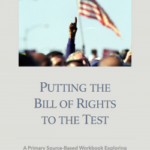The film “Second Amendment: D.C. v. Heller and McDonald v. Chicago” examines the history of guns and gun ownership in our society from the Revolutionary War to modern times and the complicated debate over what the founders intended when they wrote the Second Amendment. Does it protect a right of individuals to keep and bear arms? Or is it a right that can be exercised only through militia organizations like the National Guard?
Bill of Rights Overview
The Bill of Rights is the first 10 amendments to the U.S. Constitution. These amendments guarantee essential rights and civil liberties, such as the freedom of religion, the right to free speech, the right to bear arms, trial by jury, and more, as well as reserving rights to the people and the states. After the Constitutional Convention, the absence of a bill of rights emerged as a central part of the ratification debates. Anti-Federalists, who opposed ratification, pointed to the missing bill of rights as a fatal flaw. Several states ratified the Constitution on the condition that a bill of rights be promptly added. Pop over to the National Constitution Center’s learning module to discover more!
The Second Amendment
Why do we have a right to bear arms? How has that right changed? This video lecture is part of an online course called “Introduction to Key Constitutional Concepts and Supreme Court Cases,” taught by University of Pennsylvania law professor Kermit Roosevelt III. The course explores the questions: Where does the Constitution come from? How has it changed over the years? How do we know what it means?
Annenberg Classroom’s That’s Your Right

This fun online card game teaches middle and high school students about their rights under the Bill of Rights, the first ten amendments to the Constitution. The game offers three skill levels as a player tries to match a right with scenario. Founder cards grant players special abilities that give them an advantage in game play.
Putting the Bill of Rights to the Test

This primary source-based workbook (as PDF or eBook/ePub) helps students explore some of the protections found in the Bill of Rights and how they’ve been tested throughout U.S. history. Each chapter includes background information, guiding questions, analysis questions, primary sources, and discussion questions. Concepts include freedom of religion, speech and press; the right to assemble, petition, bear arms, and have counsel; search and seizure; due process; and cruel and unusual punishment.
McDonald v. City of Chicago (2010)
Does the right “to keep and bear arms” apply to state and local governments and thus limit Chicago’s ability to regulate guns? This case summary shows how the Supreme Court answered that question in 2010.
Constitutional Index – Amendment 2 Keep and Bear Arms Clause
The Constitutional Index breaks down the U.S. Constitution by Section, Amendment, and Clause and contains broader topics and themes. These are used to cross-reference Library resources in an effort to annotate constitutional history.